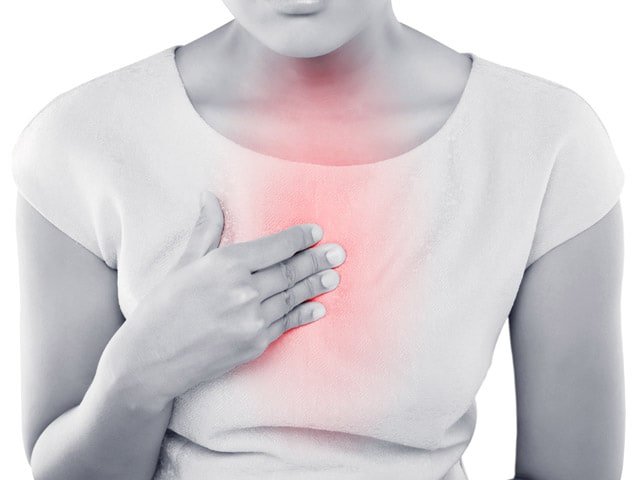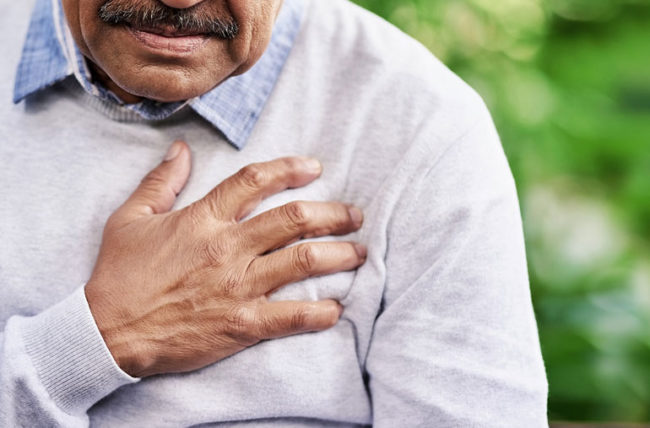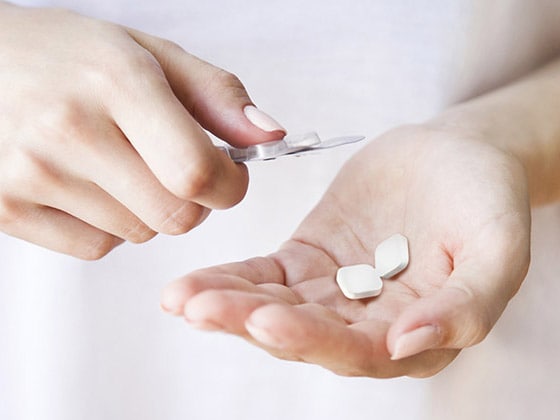

If you’ve ever experienced an unknown pain in your chest, you may have thought the worst and attributed it to a heart problem.
However, chest pain is often not a symptom of anything as serious as that.
Even though some chest pain can be sign of heart problems; it is also commonly felt by those suffering from heartburn or gastro-oesophageal reflux disease (GERD/GORD).
So how can you tell if you have heartburn or a heart condition?
WHAT IS HEARTBURN, ACID REFLUX AND GASTRO-OESOPHAGEAL REFLUX DISEASE (GERD)?
As part of normal digestion, the stomach produces acid to help break down the food we eat.
It is usually contained within the stomach but, sometimes, the valve between the stomach and the oesophagus (food pipe); doesn’t work as it should, allowing acid to escape and irritate the sensitive lining of the food pipe.
This is called acid reflux and the associated burning sensation in the chest is commonly referred to as heartburn.

Gastro-oesophageal reflux disease (abbreviated to GERD or GORD); is a condition in which a person experiences uncommonly frequent bouts of acid reflux.
Many people experience acid reflux and heartburn occasionally, but when it’s frequent and severe it may be diagnosed as GERD.
Sometimes, the pain produced by GERD can be mistaken for heart-related chest pains so it’s important to understand your symptoms and to consult a doctor if you are unsure about the root of any pain you are experiencing.
DIFFERENTIATING CARDIAC AND NON-CARDIAC CHEST PAINS
Whilst the pain of heartburn or GERD and heart conditions occur behind the breastbone, there are different symptoms that can help you to tell them apart.
- Heartburn (a burning sensation in your throat or chest) that occurs frequently after eating
- Unpleasant, sour taste in your mouth caused by acid reflux
- Difficulty swallowing
- Regurgitation of food or sour liquid
- Sensation of a lump in your throat
- Bloating
- Burping.
Although symptoms of heart attacks can be varied, those who experience cardiac pain tend to find it occurs in the centre or left side of the chest.
Furthermore, cardiac pain is more likely to spread to other parts of your body, including your back, shoulders, neck and arms – particularly, the top of your left arm.
The pain also tends to be a deep, constantly severe, and tight sensation, whereas the pain from GERD is generally sharper and harsher when inhaling.
Other symptoms of a heart attack include:
- Shortness of breath
- Irregular heartbeat
- Dizziness
- Nausea
- Numbness, especially in left arm or shoulder.
If you do suspect you are experiencing a heart attack, you should seek immediate medical attention.
WHAT TO DO ABOUT HEARTBURN, ACID REFLUX AND GERD?

Fortunately, heartburn, acid reflux and GERD symptoms can often be managed with simple lifestyle changes or over-the-counter medications, such as Rennie.
A few small lifestyle changes you can make to help manage your GERD symptoms include:
- Eat smaller portions more frequently
- Try not to lie down too soon after eating as this can put pressure on the valve at the top of the stomach
- If you do lie down after eating, try raising the head of the bed by 10 to 20cm to help prevent stomach acid travelling up towards your chest
- Try to maintain or reach a healthy weight.
If your chest pain continues after making these changes, you should seek advice from a doctor or pharmacist.
You may need medication to help manage your symptoms or it could be a sign of a different condition.
Credit: Osigweh Lilian













